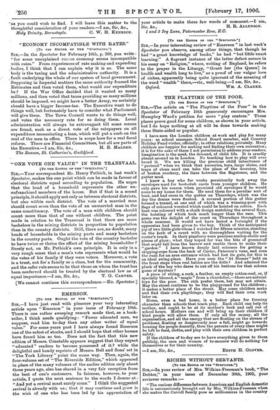'"ONE VOTE ONE VALUE" IN THE TRANSVAAL.
[TO THZ EDITOR OF TIIS " SPECTATOR:1
SIR,—Your correspondent Mr. Henry Pethick, in last week's Spectator, makes the one point which can be made in favour of electoral districts equal according to population. He urges that the bead of a household represents the other un- enfranchised members of the house. But if that is a sound 'principle, it should apply not only as between electoral districts, but also within each district. The vote of a married man 'should count more than the vote of an unmarried man in the same constituency. The vote of a man with children should count more than that of one without children. The point made in relation to the Transvaal is that there are more bachelors in the mining districts in proportion to population than in the country districts. Still, there are, no doubt, many heads of households in the mining parts and many bachelors in the country parts. Ought the vote of the country bachelor to have twice or thrice the effect of the mining householder ? Surely; not, on Mr. Pethick's own principle. It is only in a very rough sense that a man's vote represents what would be the votes of his' family if they were voters. Moreover, a vote is a trust, not for' a family or a class, but for the community, and the safer rule seems to be that those on whom the trust has been conferred should be treated by the electoral law as of equal importance.—I am, Sir, &c., T. G. CARVER.
[We cannot continue this correspondence.—ED. Spectator.]










































 Previous page
Previous page